November is the male cancer awareness month. The Brussels University Hospital support the Movember initiative and remind the importance of cancer screening for men
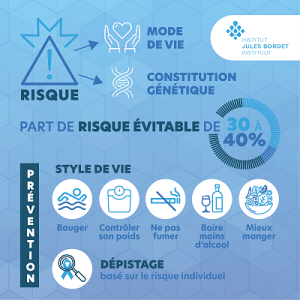 We are not all equal in the face of cancer. Independently of lifestyle, the risk varies depending on our genetic makeup. Some genetic mutations bring an increased risk. Similarly, the existence of cancers in the family or personal cancer antecedents increase the individual risk. But for the vast majority of people with an average risk, the share of the avoidable risk is 30-40%. There are two main components of prevention: lifestyle and screening.
We are not all equal in the face of cancer. Independently of lifestyle, the risk varies depending on our genetic makeup. Some genetic mutations bring an increased risk. Similarly, the existence of cancers in the family or personal cancer antecedents increase the individual risk. But for the vast majority of people with an average risk, the share of the avoidable risk is 30-40%. There are two main components of prevention: lifestyle and screening.
The recommended lifestyle measures are summed up in the European Code Against Cancer: don't smoke, drink less, eat better, move and watch your weight.
Screening concerns the most common cancers. For men these are intestinal, prostrate, skin and lung cancer. Screening is becoming increasingly personalised: before proposing screening procedures, the individual risk is assessed.
Prostate cancer
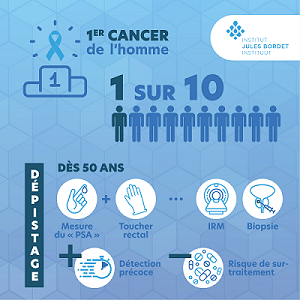 The most common cancer among men. It affects one in 10 men.
The most common cancer among men. It affects one in 10 men.
There are pros and cons to prostate cancer screening. It permits detection of cancers at an early stage, which is the only stage when it is curable. But there is the risk of overtreatment (detection of cancers that would not have posed a problem if they had not been detected and are therefore treated unnecessarily). In men with no particular risk the screening can be proposed from the age of 50 and consists above all of measuring the "PSA" (Prostate-Specific Antigen) level in the blood coupled with a digital rectal examination. Depending on this level and/or the rate at which the PSA level changes between two readings, magnetic resonance imaging can subsequently enable the urologist to recommend a biopsy in the case of any anomaly. Some people are at greater risk, for example in cases of genetic mutation, a family history or among men of African origin. 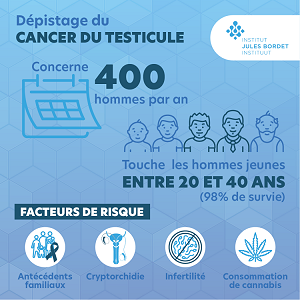
Testicular cancer
Testicular cancer is more rare, affecting about 400 men per year and affecting young men between 20 and 40 years of age. Family history, cryptorchidism (undescended testicle), infertility or cannabis use are risk factors.
Progress due to multidisciplinary care in a reference center such as the Jules Bordet Institute makes it possible to overcome this disease even at an advanced stage in most cases.
Colorectal cancer
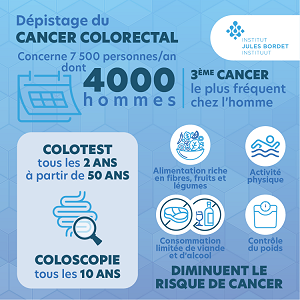 Colorectal cancer, the 3rd most common cancer in men, affects 7500 people/year, including 4000 men
Colorectal cancer, the 3rd most common cancer in men, affects 7500 people/year, including 4000 men
For the vast majority of men (average risk), we recommend a blood test in the stool every two years ("Colotest") from the age of 50, or a colonoscopy every 10 years.
In rare cases, there may be a genetic risk (certain diseases of the intestine that are hereditary). The risk is also higher when there are bowel cancers in the close family, or in people with inflammatory bowel disease. In these cases, screening by colonoscopy every 2 to 5 years is recommended, sometimes as early as age 40.
A diet rich in fiber, fruits and vegetables, limited consumption of meat and alcohol, regular physical activity and weight control reduce the risk of bowel cancer.
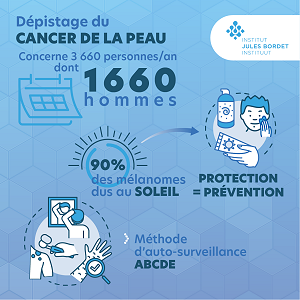 Skin cancer
Skin cancer
Skin cancer affects 3660 people/year, 1660 of whom are men.
Screening for this cancer is not recommended systematically for everyone. It is useful for people with a white skin and a high risk: cases of skin cancer among close family members, pale skin that is sensitive to the sun, high exposure to the sun (outdoor occupations, living in very sunny climates). It should be noted that 90% of melanomas are caused by the sun's UV rays. Some genetic mutations ((BRCA 2, etc.) increase the risk significantly. Screening consists of a visual examination once a year, possibly coupled with a cartography and dermatoscopy if a suspect lesion is detected, with self-monitoring based on ABCDE criteria (Asymmetry, irregular Borders, uneven distribution of Colour, a Diameter that is greater than 6 mm or Different (another aspect than the other naevi), Evolution or Elevation (thickness)).
Lung cancer
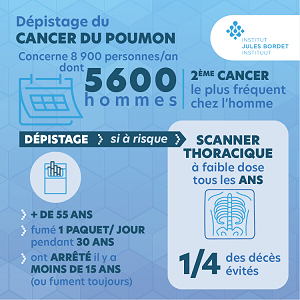 Lung cancer affects 8900 people/year, 5600 of whom are men. It is the 2nd most common cancer in men. Screening for lung cancer is reserved for persons aged over 55 who have smoked a pack a day for 30 years and who stopped smoking less than 15 years ago (or who still smoke). For these risk persons it is also recommended to undergo a low dose thoracic scan every year. In this way it is recommended to undergo a low dose thoracic scan every year. In this way it is possible to reduce by a quarter deaths from lung cancer among this risk group.
Lung cancer affects 8900 people/year, 5600 of whom are men. It is the 2nd most common cancer in men. Screening for lung cancer is reserved for persons aged over 55 who have smoked a pack a day for 30 years and who stopped smoking less than 15 years ago (or who still smoke). For these risk persons it is also recommended to undergo a low dose thoracic scan every year. In this way it is recommended to undergo a low dose thoracic scan every year. In this way it is possible to reduce by a quarter deaths from lung cancer among this risk group.
Images source : Registre du Cancer 2019